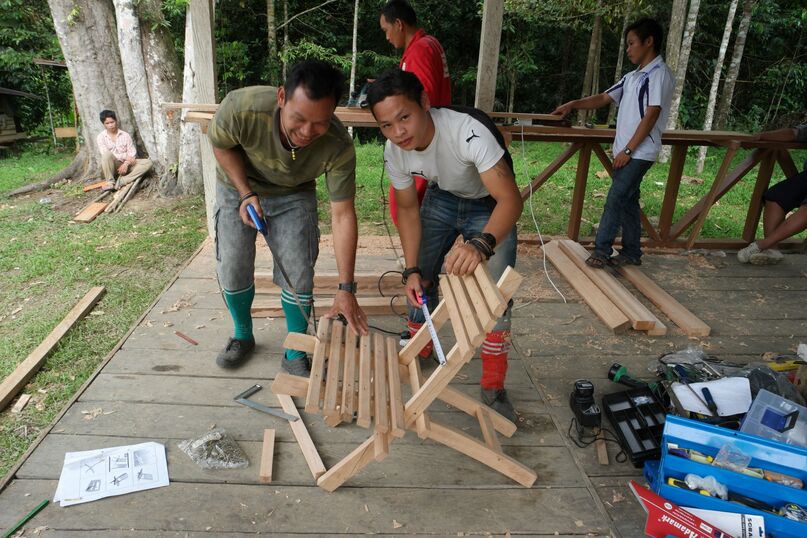International Day of Forests 2022: Choosing sustainably produced tropical wood for people and the planet
21 March 2022

Choosing sustainable tropical wood is crucial for the long-term health and vitality of the planet and for forest-dependent communities. Photo: W. Cluny
Yokohama, 21 March 2022: Tropical forests and tropical wood products are vital for addressing urgent climate-change challenges and providing the world with much-needed natural resources and rural communities with sustainable development opportunities, according to ITTO Executive Director Sheam Satkuru, speaking on the International Day of Forests.
“The value of tropical forests for their biodiversity, contributions to climate-change mitigation and adaptation and many other reasons is well-known, and these forests also provide livelihoods for millions of people who depend on them,” said Ms Satkuru.
“But much less acknowledged is the important role that the tropical timber industry plays when based on sustainable forestry in our quest for a healthy planet. Using sustainably produced tropical wood products is a responsible choice for environmentally conscious consumers.”
Tropical timber has many laudable features—such as durability, aesthetic appeal and strength. When using for long-life products and installations such as in construction (indoor and outdoor applications) and furniture, it stores carbon for decades and even centuries, thus helping mitigate climate change. Tropical wood products also help reduce greenhouse-gas emissions by substituting for more polluting and less-environmentally friendly materials. The sustainable harvesting of tropical timber adds value to forests while conserving them, providing much needed revenue to forested countries to enable them to implement sustainable forest management (SFM), especially in the tropics.
Nevertheless, tropical timber and tropical wood products are locked in a battle for market share with metals, concrete and plastics, as well as non-tropical woods. In some markets, perceptions of tropical forestry as a cause of forest degradation and loss continues to hinder the sector. For many consumers, especially in developed countries, tropical timber brings to mind images of forest degradation and deforestation.
“The theme of the International Day of Forests 2022, Choose Wood for People and the Planet, is the perfect occasion to assert the message that harvesting tropical timber sustainably is not deforestation,” said Ms Satkuru. “More than ever, we need to strengthen the role of sustainable forestry, including sustainable wood production and especially consumption, to build back better sustainably post-COVID-19 and in the face of current global disturbances.”
SFM has always been at the core of ITTO’s work, and it is essential for ensuring that wood is produced legally and sustainably. SFM enables the continuous flow of forest products and services from forests while maintaining forest values, productivity and the resilience and renewal capacity of forests; ensuring the conservation of forest soils, water, carbon stocks and biodiversity; supporting food security and the cultures and livelihoods of forest-dependent communities; and ensuring the equitable sharing of benefits arising from forest use.
SFM is a vital element of Sustainable Development Goal (SDG) 12 (“sustainable consumption and production”). Ms Satkuru said that legal and sustainable supply chains—ensuring that forest operators adhere to the principles of legality and sustainability, from the management of the forest resource through processing, marketing and consumption—are appropriate means for achieving the aims of SDG 12.
“Legal and sustainable supply chains minimize negative environmental and social impacts, addressing issues such as pollution, the treatment of workers, gender equity, biosecurity, marginalized people, biodiversity and land use,” said Ms Satkuru. “ITTO is encouraging this through our Legal and Sustainable Supply Chains Programme.”
ITTO has funded many projects and activities to promote the sustainable production and marketing of tropical wood and wood products.[i]
“Shifting the focus to sustainable consumption by providing market access and the balance needed for sustainable production is critical for the existence and future of tropical forestry,” said Ms Satkuru.
Choosing sustainably produced tropical wood over other, less eco-friendly materials is crucial for the long-term health and vitality of the planet. Encouraging this responsible choice requires ramped up efforts at all scales and from all actors. ITTO will continue working with its members and partners towards this end.
[i] In Guatemala, for example, an ITTO project assisted forest communities in developing forest-based businesses with legal and sustainable supply chains, including an enterprise making wood-based kitchenware and another creating novelty items using pine needles. The two ventures are increasing incomes and inspiring others to adopt SFM.
In the Philippines, an ITTO project helped develop a timber-tracking system as a means for improving forest governance, adding transparency to wood-processing operations and increasing investor confidence in the timber sector.
ITTO Fellowships have helped more than 1400 young and mid-career professionals pursue career development opportunities in diverse aspects of legal and sustainable tropical timber supply chains—such as Cameroon’s Jean-Bosco Saha Tchinda, who investigated a promising composite wood product using wood waste and recycled polyvinyl chloride as an eco-friendly alternative to traditional plastics.
ITTO is also helping educate and inform practitioners and the public on legal and sustainable tropical timber supply chains through an online course. Ultimately, this and other education efforts will increase capacity in the production and supply of sustainable timber and encourage support for sustainable tropical wood products supply chains among consumers.
